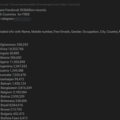
All work-related chat messages from the Dutch political top must be saved. This is the advice of the Advisory Board on Public Access and Information Management to the Minister of the Interior, Hanke Bruins Slot.
Het ACOI concluded at the end of last year that this working method is not sufficient.Guideline for the advice is the Open Government Act, formerly the Government Information (Public Access) Act. It states that everyone should be able to access government information, including chat messages and text messages. In addition, there is the Archives Act, which is about the careful storage of government information. “Access to government information is an essential right for everyone and necessary to make democracy work better. This applies not only to notes, reports and e-mails, but also to chat messages,” writes ACOI chairman Ineke van Gent.
According to the advisory board, the government must store the chat messages of ‘persons in key positions’ in a management system of the organization. This concerns work-related messages from ministers, administrators and senior officials. According to the ACOI, this archiving of chat messages should be done ‘structurally and automated as much as possible’.
The ACOI wants chat messages from ministers and administrators to be permanently archived. Messages from senior officials can be stored temporarily, for example for five to ten years. No further measures are necessary for chat messages from other government officials, according to the ACOI. The Board calls on ministers to apply this new retention strategy for chat messages from 2024 and asks parliament to deal with the advice as soon as possible. The Advisory Board believes that no further measures are necessary for chat messages from all other government employees.
The Open Access and Information Management Advisory Board was established in May 2022. The reason for this was the parliamentary debate of May 2022, which was about the fact that Dutch Prime Minister Rutte deleted text messages from his work phone for years. The Government Information Inspectorate concluded in October that he should not have done that.











